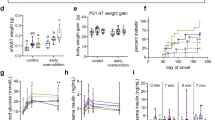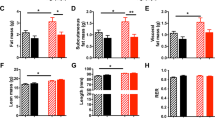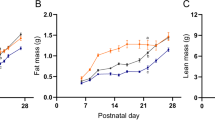Abstract
KNITTLE and Hirsch1 reported that varying the calorific intake of newborn rats by manipulating litter size during the 21-d suckling period followed by allowing free access to food after weaning caused the rats from small litters to have more adipocytes in the epididymal depot than rats from large litters. Hirsch and Han2 reported that marked changes in depot size induced by starvation or experimental obesity produced no change in total number of adipocytes in the epididymal and retroperitoneal depots of rats even when these alterations occurred as early as 6 weeks of age. These and other studies3–5 suggest that it is the calorific intake between birth and weaning rather than later in life that plays the important role in establishing the cellularity of the adipose tissue depots of the adult. But we report here data which indicate that a reduction in food intake can markedly influence the number of adipocytes in the depots of adults even when initiated as late as 6 weeks of age.
This is a preview of subscription content, access via your institution
Access options
Subscribe to this journal
Receive 51 print issues and online access
$199.00 per year
only $3.90 per issue
Buy this article
- Purchase on Springer Link
- Instant access to full article PDF
Prices may be subject to local taxes which are calculated during checkout
Similar content being viewed by others
References
Knittle, J. L. & Hirsch, J. J. clin. Invest. 47, 2091–2098 (1968).
Hirsch, J. & Han, P. W. J. Lipid Res. 10, 77–82 (1969).
Hirsch, J. & Knittle, J. L. Fed Proc. 29, 1516–1521 (1970).
Oscai, L. B., Spirakis, C. N., Wolff, C. A. & Beck, R. J. J. Lipid Res. 13, 588–592 (1972).
Oscai, L. B., Babirak, S. P., Dubach, F. B., McGarr, J. A. & Spirakis, C. N. Am. J. Physiol. 227, 901–904 (1974).
Stiles, J. W., Francendese, A. A. & Masoro, E. J. Am. J. Phyisol. 229, 1561–1568 (1975)
Johnson, P. R., Zucker, L. M., Cruce, J. A. F. & Hirsch, J. J. Lipid Res. 12, 706–714 (1971).
Greenwood, M. C. R. & Hirsch, J. J. Lipid Res. 15, 484–493 (1974).
Schemmel, R., Mickelsen, O. & Mostosky, U. Anat. Rec. 166, 437–445 (1970).
Herberg, L., Doppen, W., Major, E. & Gries, F. A. J. Lipid Res. 15, 580–585 (1974).
DiGirolamo, M. & Mendlinger, S. Am. J. Physiol. 221, 859–864 (1971).
DiGirolamo, M., Mendlinger, S. & Fertig, J. W. Clin. Res. 17, 22 (1969).
Knittle, J. L. in Childhood Obesity (ed. Winick, M.) 135–140 (Wiley, New York, 1975).
Lemmonnier, D. J. clin. Invest. 51, 2907–2915 (1972).
Lemmonnier, D., Alexiu, A. & Lanteaume, M. T. J. Physiol. Paris 66 729–733 (1973).
Lemmonnier, D. Nutr. Metab. 16, 15–29 (1974).
Author information
Authors and Affiliations
Rights and permissions
About this article
Cite this article
BERTRAND, H., MASORO, E. & Yu, B. Post-weaning food restriction reduces adipose cellularity. Nature 266, 62–63 (1977). https://doi.org/10.1038/266062a0
Received:
Accepted:
Published:
Issue Date:
DOI: https://doi.org/10.1038/266062a0
Comments
By submitting a comment you agree to abide by our Terms and Community Guidelines. If you find something abusive or that does not comply with our terms or guidelines please flag it as inappropriate.



